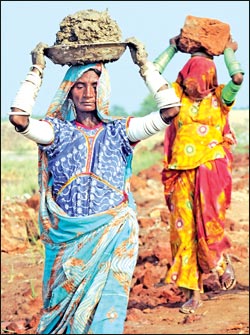Poor economies press for post-crisis role
With the US-driven global financial crisis still wreaking havoc in
the developing world, poor countries say they now want to make sure they
get a bigger role in future international economic policy.
“When our fate is being discussed it seems important to us that our
opinions be taken into account,” Niger’s finance minister, Ali Lamine
Zeine, said on Sunday ahead of International Monetary Fund and World
Bank annual meetings in Istanbul.
|

Pakistani peasants carry mud and stones over their heads to
construct a mud house for themselves in the ‘courage town’ of
Himatabad in the suburbs of the southern city of Hyderabad.
Families trapped in the bonded agreement all work together, the
men and women preparing the clay and making bricks while the
children gather them and ferry the building materials in the
hazardous kiln area. AFP |
Developing nations want more voting rights in the IMF and World Bank,
as well as a seat in the Group of 20 leading world economies after world
leaders last month designated it as the main global economic policy
forum.
“The developing countries are clearly the innocent victims in this
crisis. This is a crisis that was basically made in the USA,” said
Joseph Stiglitz, a Nobel Prize-winning economist and professor at
Columbia University in New York.
While emerging economies like China and India have been handed a
greater role in economic policymaking in recognition of their growing
influence, the developing world is still at the bottom of the pile,
experts said.
The IMF is increasingly turning its attention to the fate of
low-income countries, promising in July to step up lending to poor
nations to 17 billion dollars by 2014 including eight billion dollars by
2011.
Britain and France said on Saturday that they would mobilise four
billion dollars (2.7 billion euros) for poor countries by giving up part
of a recent IMF allocation of an international reserve asset.
“No one can accuse the World Bank and IMF of ignoring the crisis in
the poorest countries, but they’re still far from being accountable to
the people hit hardest,” international aid agency Oxfam said in a
statement. Developing countries argue that they cannot shape policies
that affect them directly because they lack a voice in international
financial institutions and have also siganlled concern about incurring
major debt for years to come.
“A third of our budget is devoted to repaying the debt,” said Ivory
Coast’s finance minister Charles Koffi Dybi.
“That’s enormous and that stops us from developing,” he said.
Stiglitz said: “I think there’s the beginning of a recognition of the
fact that the developing countries don’t want to get into another debt
cycle.”
“Therefore the funds that are going to be necessary for supporting
their active participation in the global system have to be in the form
of grants.”
African countries have been particularly hard hit by the economic
crisis, which has seen a plunge in the price of crucial raw material
exports as well as a fall in levels of money sent home by African
emigrants abroad.
The IMF is forecasting growth in sub-Saharan Africa of just 1.0
percent this year compared with 5.25 percent in 2008, while emerging
economies like China and India are expected to recover at a much faster
rate.
The 35-nation Heavily Indebted Poor Countries group, which includes
29 African countries, is now lobbying for a seat alongside developed
nations and major emerging economies at the G20.
“There has to be at least one seat for nearly a billion Africans who
need to be heard,” Cameroonian Finance Minister Lazare Essimu Menye
said.
Asked if G20 member South Africa could represent the continent, Menye
said: “South Africa defends its own economy.”
“Our partners have to accept that we are best-placed to explain to
them what would be best for Africa.”
`AFP |



